Today’s Current Affairs:17th October 2025 for UPSC IAS exams, State PSC exams, SSC CGL, State SSC, RRB, Railways, Banking Exam & IBPS, etc
Table of Contents
Zombie Deer Disease : In News
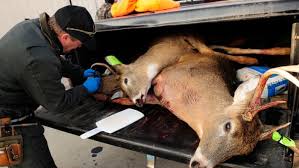
Health officials in Florida recently have confirmed cases of Chronic Wasting Disease, commonly known as “Zombie Deer Disease.”
- Zombie Deer Disease known scientifically as Chronic Wasting Disease (CWD), it is a progressive and fatal neurological disease which primarily affects deer, elk, moose, and reindeer.
- It affects the central nervous system (the brain and the spinal cord).
- CWD is caused by infectious proteins called prions.
- Prions are unique in that they don’t contain DNA or RNA, unlike bacteria or viruses.
- Instead, they are misfolded proteins that cause other proteins in the brain to likewise misfold, ultimately leading to brain damage.
- Once these proteins accumulate in the brain, they create spongy holes in the tissue, resulting in severe neurological dysfunction.
- CWD prions are highly contagious and spread through body fluids such as saliva, feces, blood, or urine, either by direct contact or environmental contamination.
- Once present in an area, prions remain infectious in soil, water, and plants for years, posing long-term risks to animal populations.
- It has an extended incubation period averaging 18–24 months between infection and the onset of noticeable signs. During this time frame, animals look and act normal.
- The most obvious sign of CWD is progressive weight loss.
- Numerous behavioral changes have also been reported, including decreased social interaction, loss of awareness, and loss of fear of humans.
- Diseased animals also may exhibit increased drinking, urination, and excessive salivation.
- In the final stages of disease, animals become debilitated and ultimately die.
- It is always fatal in infected animals. There is no vaccine or treatment.
- So far, there has been no confirmed case of CWD transmission to humans. However, experts remain cautious.
New Development Bank : In News
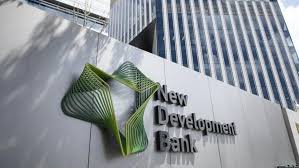
Pakistan has sought the help of China, which it considers an “iron friend”, to get a membership of the Brics Development Bank.
- The New Development Bank (NDB), formerly known as the BRICS Development Bank, is a multilateral development bank established by Brazil, Russia, India, China, and South Africa (BRICS).
- NDB aims to mobilize resources for infrastructure and sustainable development projects in BRICS countries and other emerging economies and developing countries.
- The idea of setting up NDB was first conceived in 2012 during the BRICS Summit in New Delhi, India.
- The agreement for establishing the NDB was signed during the BRICS Summit held in Fortaleza on July 15, 2014, and the Bank started operations on July 21, 2015.
- The bank is headquartered in Shanghai, China, with regional offices in South Africa and Brazil.
- Membership in NDB is open to any member of the United Nations.
- NDB’s key areas of operation include clean energy and energy efficiency; transport infrastructure; water and sanitation; environmental protection; social infrastructure; and digital infrastructure.
- The NDB has an initial authorized capital of USD 100 billion and an initial subscribed capital of USD 50 billion, which was equally distributed among the five founding members (Brazil, Russia, India, China, and South Africa).
- Unlike in the case of the World Bank or ADB, each member in the NDB has an equal voting power.
- The Bank is governed by a Board of Governors made up of the finance ministers of the five BRICS countries, and a Board of Directors.
- Both the presidency and vice-presidency of the NDB are rotated among BRICS founding members.
Tuvalu:
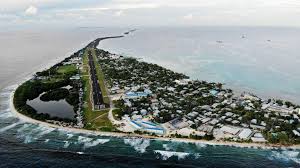
The Government of Tuvalu has officially become the 90th State Member of the International Union for Conservation of Nature (IUCN) recently.
- Tuvalu, formerly known as the Ellice Islands, is an island country in the west-central Pacific Ocean.
- It is the 4th smallest country in the world with 26 sq.km. of land.
- It sits about halfway between Australia and Hawaii.
- Its neighbours include Kiribati, to the north, and Fiji, to the south.
- It is a collection of small islands and atolls largely made out of coral reefs and volcanic rock.
- All islands are low-lying, with no point on Tuvalu being higher than 4.5 m above sea level. Thus, the islands are threatened by any future sea level rise.
- There are no rivers. Tuvalu’s climate is hot and rainy.
- With the exception of tiny Vatican City, Tuvalu has the fewest inhabitants of any other independent nation.
- Capital: Funafuti
- Most people speak a language called Tuvaluan. English is widely used.
- Currency: Tuvalu dollar (equivalent to the Australian dollar)
- Tuvalu became independent from the United Kingdom in October 1978.
- It operates as a parliamentary democracy under a constitutional monarchy.
- It is part of the Commonwealth Realm, with King Charles III recognized as King of Tuvalu. He is represented by a Governor-General, who is appointed upon the advice of the Prime Minister.
- There are no political parties: the prime minister is chosen by and from the legislature.
- Most people are subsistence farmers and are aided by remittances from relatives working overseas.
- A small quantity of copra is produced for export, the sale of stamps accounts for modest earnings, and fees are collected from foreign fishing fleets.
Rakchham Chitkul Wildlife Sanctuary:
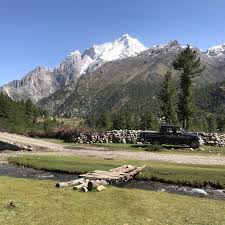
An international bird-watching programme was recently organised at the scenic Rakchham area of the Rakchham-Chitkul Wildlife Sanctuary in Himachal Pradesh.
- It is located in the Kinnaur district of Himachal Pradesh.
- It is spread over an area of 30.98 sq.km.
- It is situated at an elevation ranging from 3200 to 5486 meters above sea level.
- It is a part of the Western Himalayan range.
- It is surrounded by snow-capped mountains, lush green valleys, and gushing rivers.
- The perilous Lamkhanga Pass is one of the many trekking routes that pass through this sanctuary.
- This pass connects the Himachal Pradesh province of Kinnaur to the Uttarakhand region of Gangotri.
- Unlike the climate of other sanctuaries in Himachal Pradesh, the sanctuary is located in a dry zone, hence it does not experience monsoons.
- Some of the common flora found in the sanctuary include rhododendrons, oak trees, pine trees, and medicinal herbs.
- It is also home to various species of wildlife, such as snow leopards, Himalayan black bears, musk deer, and numerous bird species.
International Maritime Organization:

The United States President Donald Trump recently said that he was “outraged” that the International Maritime Organization would be voting on whether to impose a carbon emissions price on global shipping and called it a “Global Green New Scam Tax.”
- It is the United Nations’ specialized agency responsible for the safety and security of shipping and the prevention of marine pollution by ships.
- With 176 Member States and three Associate Members, IMO is based in London.
- IMO is the global standard-setting authority for the safety, security, and environmental performance of international shipping.
- Its main role is to create a regulatory framework for the shipping industry that is fair and effective, universally adopted, and universally implemented.
- The IMO formulates regulations on shipping safety, maritime security, and environmental protection but does not enforce them.
- Once a member state adopts a regulation, it becomes part of that country’s domestic law.
- It contributes directly to UN Sustainable Development Goal (SDG) 14, which focuses on the conservation and sustainable use of oceans and marine resources.
- The organisation also deals with legal matters such as liability, compensation, and facilitation of maritime traffic.
- Organisational Structure:
- The Assembly is the supreme governing body, comprising all member states.
- It meets every two years to approve the work programme, budget, and elect members to the Council.
- The Council acts as the Executive Organ, overseeing IMO’s work in between Assembly sessions.
- The IMO has five major committees, which are responsible for policy development and regulation formulation, including the Marine
- Environment Protection Committee (MEPC).
- Funding is sourced through mandatory contributions by member states and also from voluntary donations and commercial revenue.
Bathou Religion:
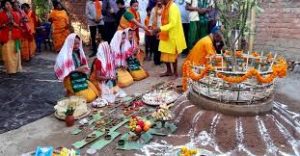
The Bathou religion of Bodo community in Assam gets a separate code in the upcoming census.
- It is the traditional faith of the Bodos, the largest plains tribe of
- The word ‘Bathou’ is derived from the Bodo language, where ‘Ba’ means ‘five’ and ‘thou’ means ‘deep philosophical thought’.
- The faith system is based on five elements: Bar (Air), San (Sun), Ha (Earth), Or (Fire), and Okhrang (Sky).
- The community worships Bwrai Bathou as the supreme god. In the Bodo language, the word ‘Bwrai‘ refers to the ‘eldest’ man concerning power or knowledge.
- The Bathou faith is centred on the Sijou plant (Euphorbia splendens).
- The plant is planted in the Bathou altar at the centre as the symbol of Bathou religion of the Bodos.
- It has an important place and has been widely accepted as the symbol of life or soul by the Bodo people since time immemorial.
- This plant is the living symbol of Bathoubwrai, the supreme God of the Bodos.
- Bodos plant the sijou tree on an elevated altar encircled with a bamboo fencing of eighteen pairs of posts weaved with five pieces of bamboo split.
- The five bamboo strips signify the five bindings of Bathou, viz. (i) birth, (ii) marriage or procreation, (iii) sorrow, (iv) happiness and (v) death.
Food and Agriculture Organization:
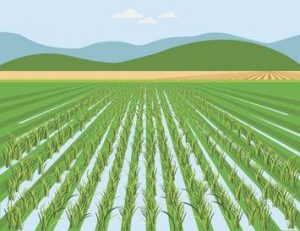
India and the Food and Agriculture Organization of the United Nations (FAO) celebrated 80 years of partnership on World Food Day 2025.It is a specialized agency of the United Nations (UN) that leads international efforts to defeat hunger.
- It is the oldest permanent specialized agency of the UN, established in October 1945.
- It is To improve nutrition, increase agricultural productivity, raise the standard of living in rural populations, and contribute to global economic growth.
- The FAO coordinates the efforts of governments and technical agencies in programs for developing agriculture, forestry, fisheries, and land and water resources.
- It leads international efforts to fight hunger.
- It is both a forum for negotiating agreements between developing and developed countries and a source of technical knowledge and information to aid development.
- It currently has 195 members – 194 countries and the European Union. (India is a founding member of FAO)
- Funding: FAO receives its funding from its member countries.
- Reports published by the FAO: The State of the World’s Forests (SOFO), The State of World Fisheries and Aquaculture (SOFIA), The State of Agricultural Commodity Markets (SOCO), The State of Food Security and Nutrition in the World (SOFI).
- Headquarters: Rome, Italy.
Nafithromycin: First indigenously discovered antibiotic
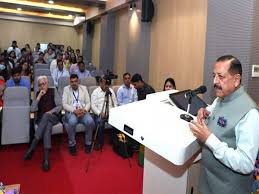
The Union Science and Technology Minister informed that India has developed its first indigenously discovered antibiotic, Nafithromycin.
- Nafithromycin is an antibiotic which has been developed with the support of “Biotechnology Industry Research Assistance Council” (BIRAC).
- It has been brought to market under the trade name “Miqnaf”.
- It is the first molecule entirely conceptualized, developed and clinically validated in India.
- It is the country’s first indigenously developed antibiotic aimed at tackling Antimicrobial Resistance (AMR).
- It is effective against resistant respiratory infections, particularly useful for cancer patients and poorly controlled diabetics.
- This innovation is designed to treat Community-Acquired Bacterial Pneumonia (CABP).
- Nafithromycin’s efficacy stands out as it targets both typical and atypical pathogens, offering a potent solution where no new antibiotic in this class has been developed worldwide for over three decades.
- Antimicrobial Resistance (AMR) It occurs when bacteria, viruses, fungi and parasites no longer respond to antimicrobial medicines.
- As a result of drug resistance, antibiotics and other antimicrobial medicines become ineffective and infections become difficult or impossible to treat.
Cape Verde Creates History with FIFA World Cup Qualification:
Cape Verde has become the second-smallest nation (after Iceland in 2018) to qualify for the FIFA World Cup. This accomplishment has put the spotlight on this little-known Atlantic island nation, highlighting both its global sporting rise and unique geopolitical identity. While Cape Verde basks in global attention, India’s national football team faced an embarrassing defeat to 158th-ranked Singapore in Goa, failing to make it to the 2027 AFC Asian Cup. The contrast underscores how even small nations with focused investment and talent nurturing can make global sporting breakthroughs.Cape Verde, officially known as Cabo Verde, is an island country in the central Atlantic Ocean, situated about 620 km off the west coast of Africa. It is named after the Cap-Vert peninsula in Senegal, the nearest point of mainland Africa.
Telangana Leads India in Mobile Phone Recovery via CEIR:
Telangana has emerged as the top-performing state in India for recovering lost and stolen mobile phones through the Central Equipment Identity Register (CEIR) portal. As of October 16, 2025, the state has successfully traced and recovered over 1 lakh mobile phones, making it a national leader in digital policing and public grievance redressal.The CEIR (Central Equipment Identity Register) portal is a government-backed system that allows citizens to report lost or stolen phones using their device’s IMEI (International Mobile Equipment Identity) number. Once reportedThe phone gets blocked across all Indian networks. Law enforcement agencies can then track and recover the device. Upon verifying ownership, the phone is unblocked and returned to the rightful ownerThe CEIR portal was initially launched in September 2022 as a pilot in Karnataka, Maharashtra, Delhi, and northeastern states, and was extended to Telangana in April 2023.
Uruguay Legalises Euthanasia, a First in Latin America:
Uruguay made history by becoming the first Latin American country to legalise euthanasia through legislation. The law decriminalises medically assisted dying for patients with incurable illnesses causing unbearable suffering, placing Uruguay at the forefront of bioethical and human rights debates in the region.While Colombia and Ecuador have previously allowed euthanasia via judicial decisions, Uruguay is the first predominantly Catholic nation in Latin America to pass a law formally legalising the practice. The move comes after five years of sustained political debate, public engagement, and ethical discourse.The Uruguayan Senate approved the euthanasia bill with a 20–11 vote, following an earlier endorsement by the lower house. This strong legislative backing reflects growing societal support for personal autonomy in end-of-life decisions.The government now faces the task of drafting and enforcing detailed implementation rules, including medical protocols, ethical safeguards, and oversight mechanisms.The law’s passage marks a pivotal moment in Latin America’s evolving stance on medical ethics and individual rights.




